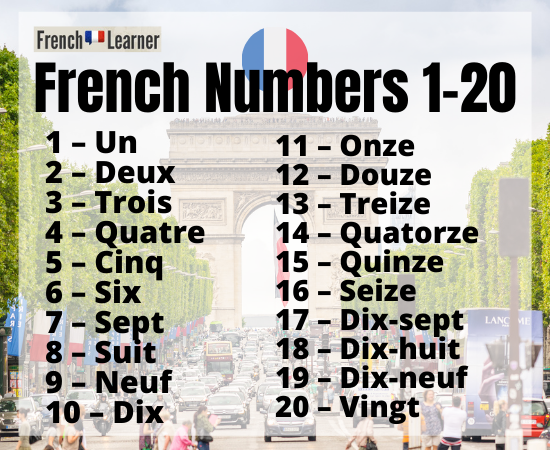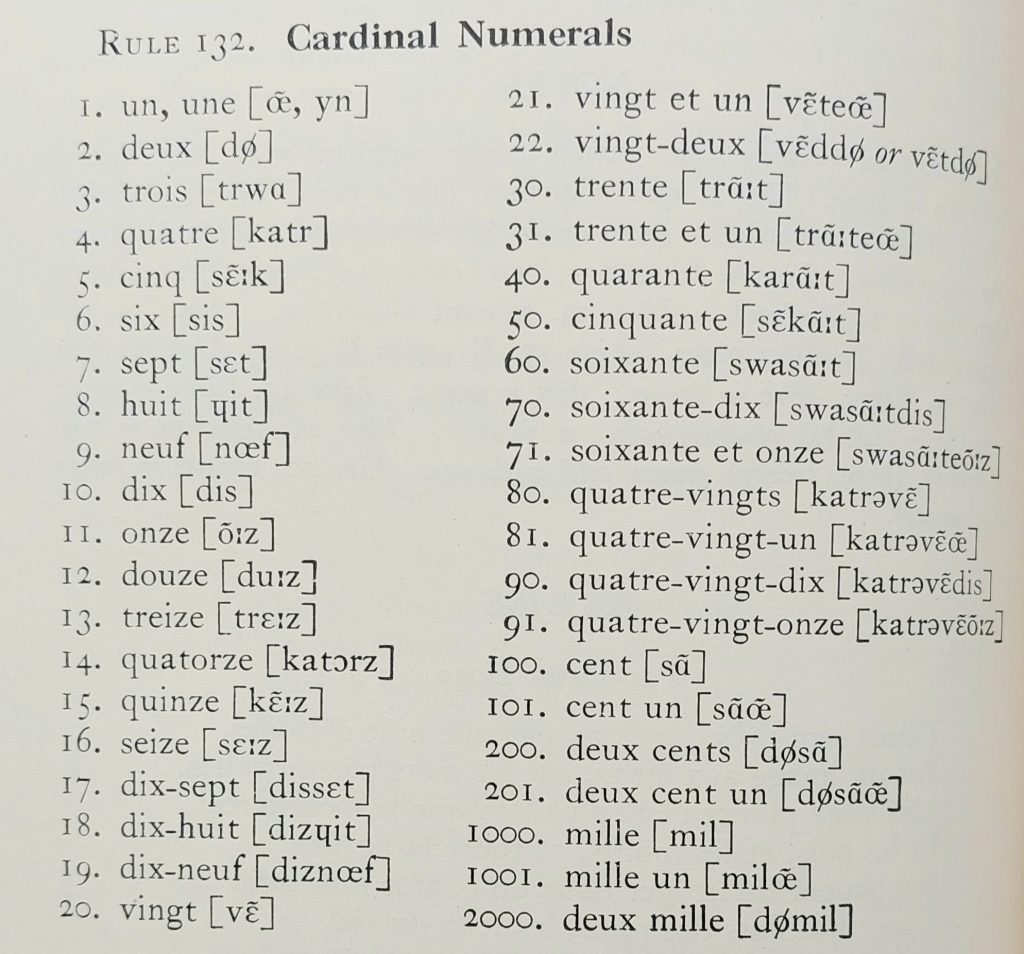The French numbers 1-100 are much more complex than un, deux trois (one, two, three). While counting from 1-20 is very straight forward, the numbers 60-100 become much more complicated. Apply our five useful tips and learn how to easily count to from one hundred in French.

French Numbers 1 to100 — Learn how to count in French
French numbers 1-20
To memorize 1-10, try counting in either even or odd numbers separately. Another effective tip is to try counting backwards from ten to zero.
French numbers 1-10
Tips for learning to count from 11-20
Many students get confused on the numbers quinze (fifteen) seize (sixteen). A fun tip is to repeat, “You Can Say Quinze Seize”.
- 11 – onze
- 12 – douze
- 13 – treize
- 14 – quatorze
- 15 – quinze
- 16 – seize
- 17 – dix-sept
- 18 – dix-huit
- 19 – dix-neuf
Many of the numbers above 10 end in the -z sound, such as onze (eleven), douze (twelve) and treize (thirteen).
You can remember that these are the “teenz”. This will help you to distinguish these numbers from the higher numbers which we’ll observe below.

French numbers 20-59
The numbers 20-59 are not very complicated. To say twenty, say vingt (pronounced vɛ̃, the same pronunciation as the word for wine, vin!).
To say twenty-one, add “et un” or and one. Then, for 22-29 simply add un, deux, trois, etc. This pattern works for the numbers all the up through 59.
Numbers 20-29
- 20 – Vingt
- 21 – Vingt et un
- 22 – Vingt-deux
- 23 – Vingt-trois
- 24 – Vingt-quatre
- 25 – Vingt-cinq
- 26 – Vingt-six
- 27 – Vingt-sept
- 28 – Vingt-huit
- 29 – Vingt-neuf
Numbers 30-39
Many students experience difficulties distinguishing the teens from these higher numbers. A tip to remember these higher numbers, such as 30 (trente) is to say, “I have a lot of aunts”.
This is because the word “aunt” (New England or UK pronunciation) rhymes with these numbers, trente, quarante and cinquante.
- 30 – Trente
- 31 – Trente et un
- 32 – Trente-deux
- 33 – Trente-trois
- 34 – Trente-quatre
- 35 – Trente-cinq
- 36 – Trente-six
- 37 – Trente-sept
- 38 – Trente-huit
- 39 – Trente-neuf
Numbers 40-49
- 40 – Quarante
- 41 – Quarante et un
- 42 – Quarante-deux
- 43 – Quarante-trois
- 44 – Quarante-quatre
- 45 – Quarante-cinq
- 46 – Quarante-six
- 47 – Quarante-sept
- 48 – Quarante-huit
- 49 – Quarante-neuf
Numbers 50-59
- 50 – Cinquante
- 51 – Cinqante et un
- 52 – Cinquante-deux
- 53 – Cinquante-trois
- 54 – Cinquante-quatre
- 55 – Cinquante-cinq
- 56 – Cinquante-six
- 57 – Cinquante-sept
- 58 – Cinquante-huit
- 59 – Cinquante-neuf
French numbers 60-79
The numbers 60-79 are often a big challenge for many students. This is where our key tips come into play.
To count from 60-69, simply say soixante, then follow the same pattern as the numbers in the previous section covering 20-59.
Numbers 60-69
- 60 – Soixante
- 61 – Soixante et un
- 62 – Soixante-deux
- 63 – Soixante-trois
- 64 – Soixante-quatre
- 65 – Soixante-cinq
- 66 – Soixante-six
- 67 – Soixante-sept
- 68 – Soixante-huit
- 69 – Soixante-neuf
When you come to seventy, you must say soixante-dix, which translates to “sixty ten”. For 71-79, you must add the corresponding teen (11-19) to soixante (sixty). Hence, seventy-one is soixante-et-onze (sixty and eleven). Seventy-two is soixante-douze (sixty twelve).
One useful tip to say the numbers 60-79 easier is to first say the word soixante without considering the entire number.
If the number is 60-69 that’s easy: Just add un, deux, trois, etc.
If the number is 70-79, the same tip applies. First say soixante. Then, add the corresponding teen. The key is to first say soixante quickly. That way, you prevent yourself from stumbling and say the number easier.
Numbers 70-79
- 70 – Soixante-dix
- 71 – Soixante et onze
- 72 – Soixante douze
- 73 – Soixante treize
- 74 – Soixante-quatorze
- 75 – Soixante-quinze
- 76 – Soixante-seize
- 77 – Soixante-dix-sept
- 78 – Soixante-dix-huit
- 79 – Soixante-dix-neuf
French numbers 80-99

The French numbers 80-99 become much more complicated. This is because to say eighty, you must say quatre-vingts, which means “four twenties”.
For the number eighty-one, the et disappears. Hence, 81 is quatre-vingt-un, which literally means “four twenty one”.
For 82-89, say quatre-vingt (4 x 20), then add un, deux, trois, etc. through neuf. Eight-five, for example is quatre-vingt-cinq (4 x 20 + 5).
Numbers 80-89
- 80 – Quatre-vingts
- 81 – Quatre-vingt-un
- 82 – Quatre-vingt-deux
- 83 – Quatre-vingt trois
- 84 – Quatre-vingt-quatre
- 85 – Quatre-vingt-cinq
- 86 – Quatre-vingt-six
- 87 – Quatre-vingt-sept
- 88 – Quatre-vingt-huit
- 89 – Quatre-vingt-neuf
To say ninety, say quatre-vingt-dix, which equates to “four twenty ten”. Then, for 91-99, add the corresponding teen number. For example ninety-five is quatre-vingt-quinze (4 x 20 + 15).
The same tips for the previous section on 60-79 apply for 80-99. For any of these numbers 80-99 first get out the word quatre-vingts. Then, worry about what you have to add.
If you are in 80-89 territory simply add un, deux, trois, etc. Then if you are 90 or higher you must add the corresponding teen number.
Again, the way to avoid stumbling is to immediately say “quatre-vingts”, then tackle the rest of the number.

Numbers 90-100
- 90 – Quatre-vingt-dix
- 91 – Quatre-vingt-onze
- 92 – Quatre-vingt-douze
- 93 – Quatre-vingt-treize
- 94 – Quatre-vingt-quatorze
- 95 – Quatre-vingt-quinze
- 96 – Quatre-vingt-seize
- 97 – Quatre-vingt-dix-sept
- 98 – Quatre-vingt-dix-huit
- 99 – Quatre-vingt-dix-neuf
- 100 – Cent
Counting in Switzerland and Belgium: Septante and Nonante
The counting system for 60-99 is much less complicated in Switzerland and Belgium.
This is because these two countries have specific words for seventy, eighty and ninety: septante (70) and huitante (80) and nonante (90).
Hence, in these countries 75, 85 and 95 would be septant-cinq, huitante-cinq and nonante-cinq.
This makes the French numbers 1-100 in these countries much easier!
This counting system eliminates the need to calculate math and cuts down significantly on the number of words required to express the corresponding numbers.
Big numbers 100 and beyond
To say both one hundred and one thousand, say cent and mille, respectively. Do not add the word un to either of these numbers.
Hence, ‘one hundred one’ and ‘one thousand one’ are cent un and mille un, respectively. For larger hundreds, add an -s: two-hundred is deux cents.
For larger thousands, never an an -s to mille. Hence, two thousand is deux mille. One million is un million and one billion is un milliard. Add an -s to both of these to make higher numbers. Hence, two million is deux millions.
- 100 cent
- 101 cent un
- 150 cent cinquante
- 524 cinq cents vingt-quatre
- 1,000 mille
- 1,001 mille un
- 1,250 mille deux cents cinquante
- 10,000 dix mille
- 1,000,000 un million
- 1,000,000 un milliard (billion)
Here’s how to say a few years in French:
- 1975: mille neuf cent soixante-quinze (you can also day dix-neuf cent)
- 2007: deux mille sept
More uses and resources for French numbers
French decimals and percentages
In France, the decimal points are written with commas. The word for comma is virgule. Hence the decimil 1.5 is written 1,5 and read as un vigrule cinq.
The word percent is written in two words in French: pour cent. Hence 50% would be cinquante pour cent.
French ordinal numbers
Ordinal numbers are counting numbers: first second, third, etc. To form an ordinal number in French, simply add -ième to the number.
Hence, second and third are deuxième and troisième. The only big exception to this guideline premier and primière for first. Our ordinal number page has a complete table with example sentences.
French fractions
To form a fraction, simply put a cardinal number (un, deux, trois, etc.) over an ordinal number. Hence, the fraction 1/5 would be un cinquième.
All fractions are masculine. Our fractions page offers a complete table with example sentences.
Math in French
Learning the French numbers is essential for talking about math. The word for plus in French is plus (say the -s).
The words for minus, multiplied by and divided by are: moins, multiplié par and divisé par.
Our math page offers a complete table covering examples of simple math problems using French numbers.

Conclusion
Félicitations ! You are now much more familiar with the French numbers 1-100. Now that you know the numbers, you can also check out our lessons covering how to tell time in French as well as how to say and read the date in French.
For an additional resource, we suggest having a look at French Today’s course Mastering French Numbers. With Camille’s extensive drills recorded at three speeds you’ll be able to rattle off even the trickiest of numbers in no time!




